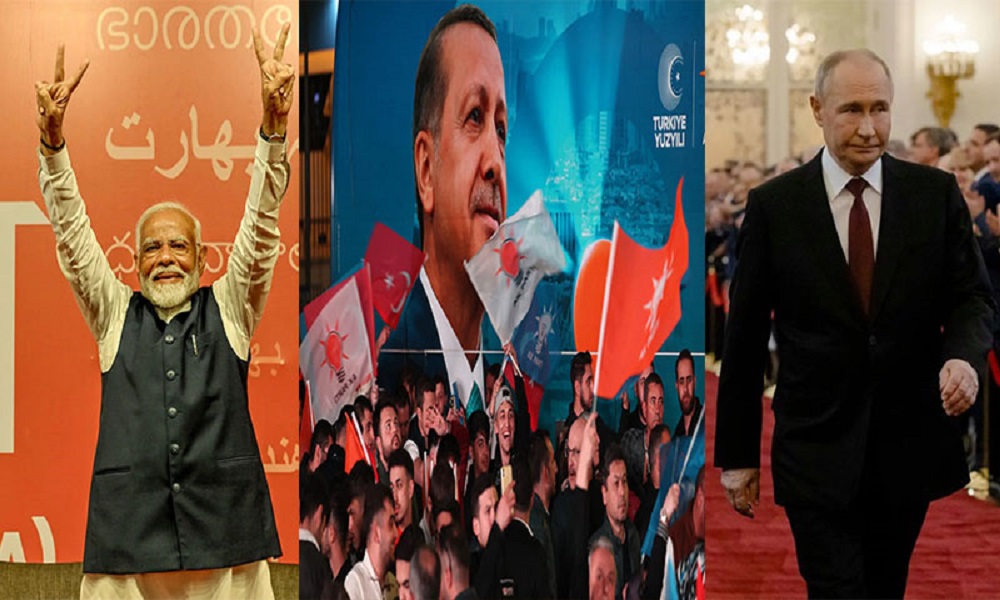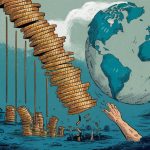
Global elections: tough messages for the powerful
Last Updated on June 7, 2024 11:51 am
In Turkey, India and other countries, where some feared that rulers would seize power, democracy has surprisingly survived.
In India, Narendra Modi’s Bharatiya Janata Party (BJP) won a third term but fell short of a single majority. In South Africa, the ruling party bowed to voters for the first time since the end of apartheid. In Britain, the election of a populist rebel group could lead to a disastrous defeat for the country’s ruling Conservatives.
A common theme in global election years is that voters want to send a strong message to those in power.
Even in Mexico, where Claudia Scheinbaum, a climate scientist and successor to President Andrés Manuel López Obrador. Who was elected by a large number of votes in last Sunday’s election. Voters have rewarded the forces that uprooted the country’s entrenched establishment just six years ago.
More than a billion people are participating in elections in more than 60 countries around the world this year. Analysts feared that 2024 would be an extreme test for democracy – which may not be the case. Over the years, populists and strongmen have strayed from the democratic mainstream, sowing doubts about the legitimacy of the election, while social media has inundated voters with confusion and conspiracy theories.
Leaders such as Indian Prime Minister Narendra Modi and Turkish President Recep Tayyip Erdogan, the world’s most populous democracy, were regarded as unbeatable. They used weapons of nationalism or sectarianism to rally supporters.
Turkish President Recep Tayyip Erdogan, who was considered close to politically invincible, has seen his support eroded by rising inflation, chronic unemployment and disappointing economic growth.
Both Modi and Erdoğan’s idols have been crushed. Rising inflation, chronic unemployment and uneven economic growth have widened inequality in India, Turkey and elsewhere, leaving voters frustrated.
“The election produced results that the ruling parties did not want,” said Ben Ansell, a professor at the Institute for Comparative Democracy at Oxford University. “They are all destabilized by a difficult economic environment and behaving like the powerful has not saved them.”
Both Modi and Erdogan are in their third term in power. But Modi’s Hindu nationalist Bharatiya Janata Party (BJP) lost dozens of seats. His party has to form the government in alliance with two secular parties. In Turkey, the opposition defeated Erdogan’s Justice and Development Party in local elections in April, consolidating control of key cities such as Istanbul and the capital Ankara.
“In many countries where there is talk of going backwards, we see the opposite,” said Professor Ansel. “For Modi and Erdogan, it was very important to address their weaknesses.”
Elections are held in different countries around the world so it is dangerous to generalize. Russian President Vladimir Putin won the March election by a landslide. He got 88 percent of the votes in the election. which is antithetical to Russian public sentiment and a reflection of an authoritarian regime. He did not face any opposition in the election.
In Europe, far-right parties are expected to do well in European Parliament elections starting Thursday. Analysts say they don’t believe it will threaten the political center that has ruled Europe since World War II.
But the success of far-right figures like Italian Prime Minister Giorgia Meloni attests to populism’s enduring appeal.
Populists and the right-wing will continue to gain power and create fear in European politics, said Eurasia Group, a political risk consultancy.
Britain was shaken on Monday when a popular politician, Brexit campaigner and former US President Donald J. Trump ally Nigel Farage announced he would run for a seat in parliament under the banner of his Reform UK party — which has a hard-line anti-immigration message.
The message will add to the headache for the Conservative Party. The party has trailed the opposition Labor Party by double digits in the polls for almost 18 months. Those who blame the party for the weak economy and rising immigration since Britain left the European Union in 2020 may refrain from voting for the Conservatives.
Some critics argue that the Conservative Party’s problems stem from its free-market policies. That has disillusioned voters in disadvantaged parts of Britain and set it apart from far-right parties in Europe or Trump’s Make America Great Again movement.
Although the Conservatives have been in power for 14 years in Britain, they face similar discontent with the status quo that fueled recent elections in India, South Africa and Turkey.
In some countries, the urge to break ties with the past has led voters to unorthodox choices. Argentina’s liberal economist Javier Milley, who came to power last November, promised to close the central bank. He called the country a corrupt political “nation”.
Source: The New York Times






